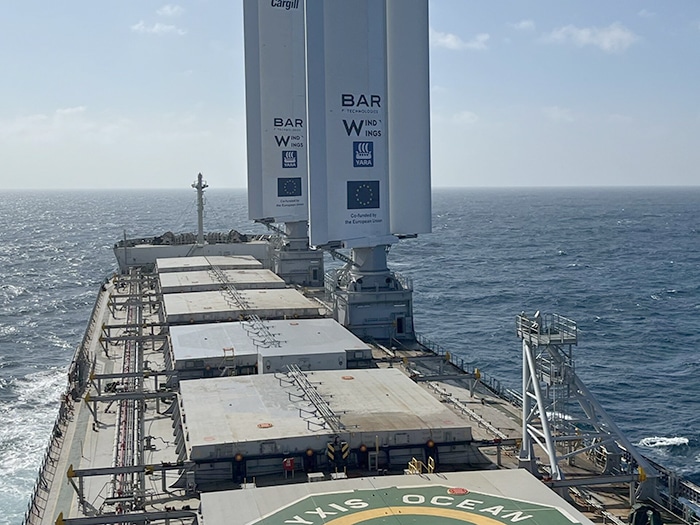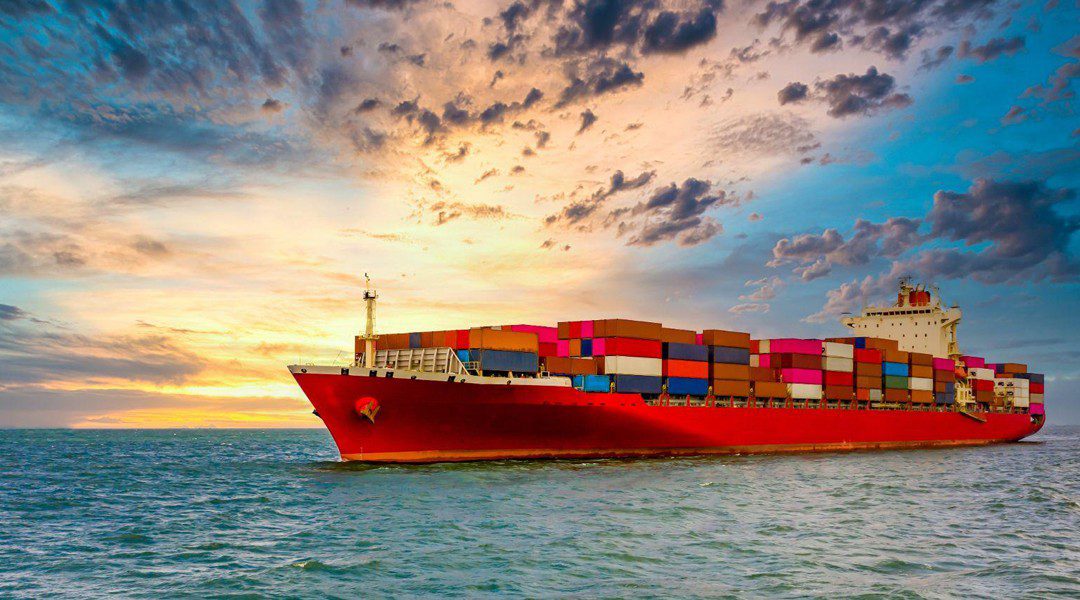
Photo: BAR Technologies
Back in August last year, the Cargill-chartered 80,962 dwt bulker Pxyis Ocean, which is managed by MC Shipping’s Singapore branch, became the first ship to sail with BAR Technologies’ WindWings, after being retrofitted with two of the hard sails at a COSCO shipyard.
VIDEO: Cargill-chartered Pyxis Ocean is first ship to sail with WindWings
In March this year, Cargill reported that the vessel had achieved performance consistent with what was predicted, which is equivalent to an average of 3 tonnes of fuel per day.
Today, BAR Technologies had more evidence of the effectiveness of the WindWings, reporting that independent evaluation by DNV has verified that, in favorable conditions, the WindWings aboard the Pyxis Ocean achieved energy savings of 32%
“Validation of the performance of the Pyxis Ocean against BAR’s simulation models has been one of our main goals from the outset of this project,” said Cargill decarbonization specialist Chris Hughes. “Having DNV involved to provide an independent perspective is an important step in that process, and this latest data builds upon the results that we shared earlier”.
As reported March, according to BAR Technologies’ evaluation of the data, energy savings from all tested conditions supports the company’s initial projections: average fuel savings of 1.5 tonnes, which is a reduction of over 5 tonnes of CO2 emissions “well-to-wake”, per WindWing per day, across all global routes and seasons. These savings, says the company, combined with the global operations of Pyxis Ocean, highlight WindWings’ versatility and effectiveness in real-world scenarios. In the future, Kamsarmax bulk carrier vessels, like the Pyxis Ocean, could carry three wings, further increasing the fuel savings and emissions reductions.
“Innovative wind assisted propulsion systems (WAPS) like WindWings, offer owners and operators new ways of saving energy and accelerating the decarbonization of the maritime industry,” said Johanna Tranell, a DNV Maritime Advisory specialist with responsibility for WAPS. “At DNV we’re continually working to build trust in these new solutions and the best way to do that is to provide transparent, 3rd party, verified, insights into the real-world performance of these systems. This is why we’re so pleased to be working with future focussed companies like MC Shipping, Cargill, and BAR Technologies, to expand the industry knowledge base on WAPS. We look forward to building on this cooperation in the future.”
Karmesh Kumar Tiwari, deputy branch general manager at MC Shipping Singapore Branch, commented, “The confirmation from DNV that WindWings are producing significant savings is a testament to the collective work of all involved and our efforts in advancing maritime fuel efficiency. This work underpins our strong commitment to integrating low carbon technologies to contribute decarbonization in the maritime industry.”
“It’s been a privilege to have the performance of our WindWings thoroughly assessed by DNV, who have been rigorous in their approach to assessing the data and applying impartial standards to the results,” said BAR Technologies CEO John Cooper. “The independent confirmation that WindWings® are producing significant savings grants huge credibility to the technology. Together with our performance guarantee – offered with all WindWings – this gives our customers the reassurance they need.”
WindWings harness wind power to propel a ship forward, reducing the reliance on engines and fuel consumption. Controlled by a touch panel on the bridge, a simple traffic light system guides the crew in raising or lowering the wings. Once raised, the wings automatically adjust to the optimal configuration based on real-time wind measurements.





